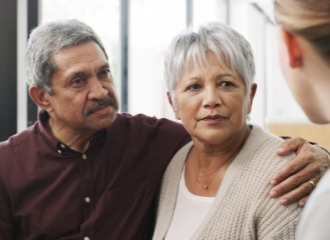Written by: Samantha DeCaro, PsyD
Supporting a loved one who has an eating disorder is a difficult task. You want to help but may be scared of saying the wrong thing, which could create unnecessary stress and make the eating disorder even worse. Here are 4 steps that will help you navigate the process.
Eating disorders are among the deadliest mental health disorders, second only to opioid overdose. They are not a phase, a choice or a lifestyle and there is no single cause. Various factors contribute to their development and reinforce the cycle.
Family, friends and partners, who are closest to those struggling with an eating disorder, can be powerful supports. So, it’s important not to ignore, deny or minimize what’s happening.
And although eating disorders often require professional, medical and psychological intervention, you can support the recovery process through the following steps.
1. Educate Yourself About Eating Disorders
Eating disorders are complex psychiatric disorders that cannot be combatted with logic or willpower alone. There are psychological, genetic, cultural, emotional, and environmental factors that likely all contributed to the onset of your loved one’s disorder. It’s important to understand that your loved one cannot stop engaging in these behaviors just because you want them to stop.
Those with eating disorders are often tortured by irrational, intrusive and obsessive thoughts about food and weight, and these thoughts ultimately fuel the compulsive cycle of restricting, bingeing and/or purging. The more you understand about the psychological and physical impact of these behaviors, the more likely you’ll be able to engage with your loved one in a compassionate and empathic way.
Yelling at or shaming your loved one will only heighten their distress, making them more likely to turn to their eating disorder for comfort and relief. Eating disorders aren’t just about food and weight; they’re emotional disorders. Learning about how and why they function can help you to remain a calm, patient and understanding presence in their lives.
2. Communicate Your Concerns
When a loved one has an eating disorder, you might be tempted to stay silent or keep your distance due to fear of making things worse. Eating disorders thrive in isolation, so ignoring the signs or avoiding your loved one will certainly not help.
Those with eating disorders often feel detached in a variety of ways, including feeling disconnected from their own bodies, their emotions and from others. Creating connection by expressing your concerns can be one way to help your loved one feel truly seen and connected again.
Choose a calm time and place to talk about your observations and ask how you can best support them. Stick with “I” statements and try to focus on what you’re noticing emotionally and socially rather than what you’re observing on the outside.
Try saying something like, “I notice how anxious you seem around food lately. If you’d like to talk about it, I’m here for you” or, “I notice you haven’t been yourself lately and seem very focused on food. How can I support you?”
If your loved one is already in treatment or recovery, a simple check-in can mean so much. Let your loved one know you’re proud of them. Tell them you see their strength and remind them that you would be willing to support their recovery in any way. Supportive actions can range from eating a meal with them, sending a text during a triggering time of day, or just listening and validating their emotional experiences.
3. Examine Your Own Beliefs About Food, Weight and Shape
Whether your loved one is fully recovered or actively struggling with an eating disorder, it is never helpful to make any mention of dieting, fasting, your own weight, or other’s weight, shape, or size. Even when certain comments are intended to be a compliment, they can reinforce the harmful belief that your loved one’s appearance is important to you. If there happens to be a time you do not give your loved one a compliment about their appearance, they will likely notice and anxiously wonder why.
Remarks about weight, even when coming from a place of sincere concern, will invariably backfire. The eating disorder can easily twist those comments into either a motivational compliment or interpret them as a hurtful insult. Help your loved one understand that they are so much more than a body and think less about superficial qualities such as weight and appearance.
In eating disorder recovery, the therapeutic work involves developing an authentic identity, identifying core values, discovering new interests, and improving relationships. Support your loved one by showing a genuine interest and unconditional acceptance of the deeper, more complex layers of their identity.
4. Encourage Professional Help
Trying to take on the role as the food police, doctor, therapist, or nutritionist will not be helpful and will likely damage trust and create tension within your relationship.
Eating disorders are ideally caught early and treated thoroughly at the appropriate level of care with a qualified multidisciplinary treatment team. The first step is to gently, yet steadily, encourage your loved one to seek out an assessment from a qualified specialist or respected treatment facility so that they can receive a proper level of care recommendation. There are various ways you can help your loved one in this process—offer to research specialists or facilities in the area, drive your loved one to their assessment appointment or accompany them during a tour of a treatment center, to name a few.
Depending on symptom frequency and severity, some individuals will be assessed and referred to residential treatment or inpatient hospitalization to recover in a setting away from home. This type of treatment often requires time, effort, and resources, so your loved one might initially be reluctant to enter treatment when they realize they will need to postpone or forego social events, family obligations, educational pursuits, and/or career goals.
You can help by insisting that your loved one prioritize their own physical and mental health above all else and by offering to help with obligations at home so that they can focus on healing. Admitting to treatment often requires courage and sacrifice, but consistent encouragement and support from family and friends can make the experience much easier.
Conclusion

Continue to remind your loved one why they are loved and valued, so that they start to truly believe their worth is not connected to the food they eat or to the number on the scale. Finally, remember to have hope even when your loved one is feeling hopeless. Recovery is possible and help is available; neither of you need to do this alone.







